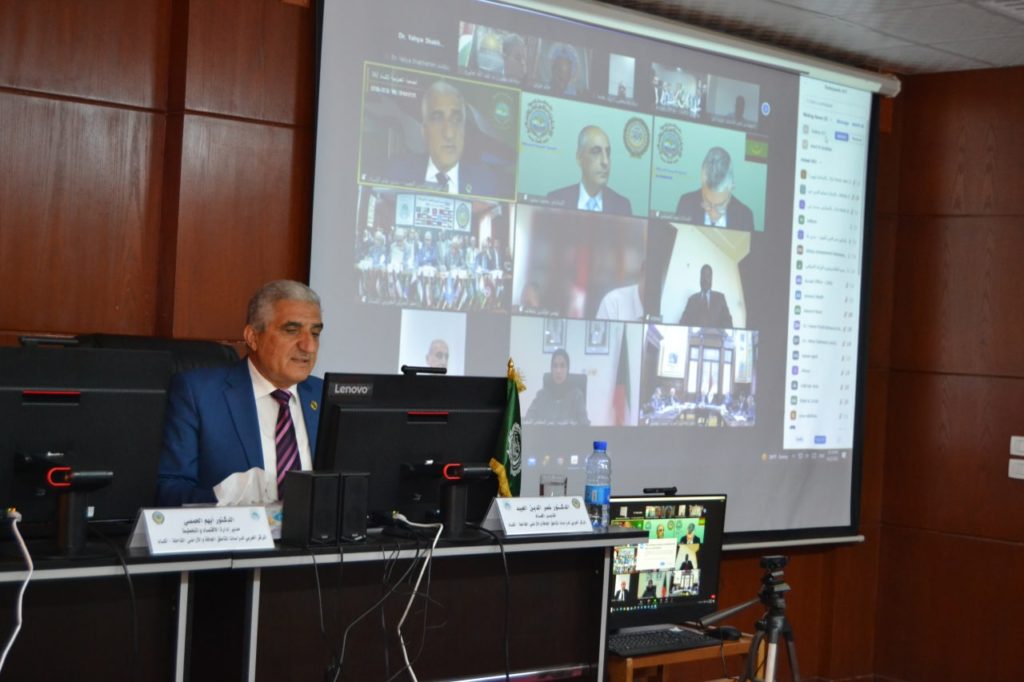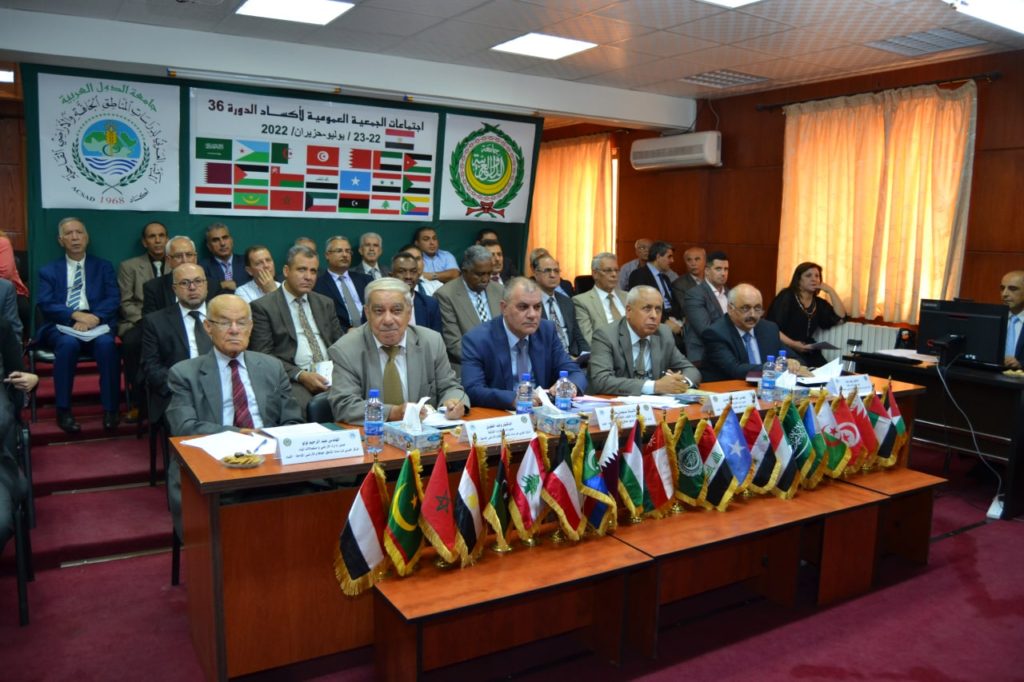The meetings of the thirty-sixth session of the General Assembly for ACSAD
Today at the headquarters of the Arab Centre for the Studies of Arid Zones and Drylands ACSAD, the meetings of the thirty-sixth session of the General Assembly for the Arab Centre ACSAD have been concluded, headed by H.E the Minister of Agriculture and Land Reclamation in the Arab Republic of Egypt, Dr Muhammed Al-kaseer, the President of the General Assembly, and in the presence of the Arab Ministers of Agriculture, the Arab countries Members’ delegations, H.E the Arab Centre’s Director-General, Dr Naser Edin Obeid, and the representatives of the concerned international and Arab organizations.

H.E the Minister of Agriculture and Land Reclamation, Dr Al-Kaseer in the Arab Republic of Egypt, the President of the General Assembly, has expressed in a speech his profound appreciation for the critical role played by the Arab Centre for the Studies of Arid Zones and Drylands ACSAD in developing the Arab Agriculture as well as the sustainable development; and the crucial applied scientific achievements provided by it contributing to natural agricultural resources development in the Arab Countries, which support the Arab food security and his efficient role in conveying technologies and knowledge, developing the staff’s capabilities and experiences who works in the Arab agricultural areas. He also voiced his gratitude and appreciation for the efforts exerted by the General Director, Dr Naser Edin Obeid, in developing and renovating the Centre’s work, activating its applied research and scientific tasks, and accelerating their implementation paces to the highest possible degree.

Dr Al-Kaseer called for facing the challenges imposed by the rapid global economic changes and developments. He said: “These impediments put us face to face in front of the technological developmental and environmental challenges, which our Arab countries suffer from, especially the issues of water-food security, which is an integral part of the Arab national security under the adverse impacts of climate changes, which have become a reality requiring to adapt with it, scarcity of the Arab water resources and misuse the available ones, in addition to the Covid-19 impacts that contribute to increasing challenges and uncover the weaknesses that we should find solutions for, as well as the adverse repercussions of the Russian-Ukraine crisis on the Arab food security.
In his turn, the ACSAD’s Director-General, Dr Naser Edin Obeid, confirmed in a speech today that the General Assembly and the Executive Council discussed, via video conference, more than 54 memorandums, most important of which the General Director’s report of the organization’s achievements, and another memorandum about following-up the implementation of the General-Assembly’s resolutions in its 34th and 35th sessions, besides action progression report and a note on the Arab Centre’s work as a distinguish Arab house of experience; the action plan and the budget of the Arab Centre of 2023 – 2024 have been approved.
He also clarified that the General Assembly has discussed the cooperation between ACSAD and other Arab, regional, and international organizations, institutions, and bodies during the period of the two sessions of the General Assembly 35th and 36th, and approved the code of ethics and rules of conduct of the Arab Centre for the Studies of Arid Zones and Drylands. It also decided to establish an actions incubator specialized in supporting and adopting innovative and creative agricultural projects and thoughts in the Arab world of the Arab Centre ACSAD; it considered them a crucial achievement that contributes to enhancing and adopting the young researchers’ and innovators’ thoughts and put it into practice.
Dr Obeid said the General Assembly discussed thoroughly ACSAD’s achievements in the field of eliciting outstanding varieties of ACSAD’s Durum wheat named (ACSAD 1105 and ACSAD 1615) and the bread wheat called (ACSAD 1133); the Arab country participating in the meetings praised ACSAD’s varieties resilient to drought, temperature, and diseases. They called for adopting these varieties due to their high productivity, which approaches about 11 tons per hectare, in addition to ACSAD’s achievements in preparing the optimal use plan of lands in the Republic of Sudan and the likely investments there found by ACSAD’s experts particularly, those related to the possibility of investment by cultivating nine million hectares, which can produce about 36 million tons of wheat and achieve the self-sufficiency.
The meeting also discussed the implementation of the hydrological map of the Arab region; the ACSAD’s orientation toward implementing the projects of integrated agricultural development, protecting and restoring the deteriorated lands of natural pasture, and evaluating the wind-erosion of the Arab world’s soils by using digital data of global platforms.
The meetings’ actions included the impact of climate change on the productive properties of land resources and the productivity of the agricultural outcomes, the recommendations of the first Arab scientific conference on the sustainable management of the water and land resources, using biotechnologies to improve Arab sheep fertilities by introducing the Borola cheese, the project of nutritional value improvement for the agricultural waste, especially the ones of the olive tree and its usage in feeding animals, and diffusing biogas technology.
Dr Obeid pointed out that the Excellencies Arab Ministers of Agriculture adopted the final accounts and auditor’s report as well as the two reports of the financial supervision authority and the internal oversight unit for 2020 – 2021.
At the end of the General Assembly’s meeting, the Excellencies Arab Ministers of Agriculture, the General Assembly’s members, issued the “Cairo Announcement”, which calls for adapting to climate changes and alleviating their adverse impacts on the Arab region. They appealed for unifying the efforts, work, and collaboration, coordinating with all concerned bodies at the Arab and international levels to find the required mechanisms for adaptation to climate change and mitigate its negative impacts on the Arab region.
Dr Obeid also manifested that the Excellencies Arab Ministers of Agriculture agreed to hold an Arab national conference on “the Arab agricultural integration under the challenges of achieving food-water security” to narrow the nutritional gap in the Arab world and accomplish the Arab food-water security through the joint Arab action.
Moreover, he explained that the Executive Council meetings on 21/6/2022 precede the General Assembly’s meetings of ACSAD, which discuss several memorandums related to the Arab Centre’s work, which shall be submitted for the General Assembly.
It is worth mentioning that the General Assembly is the High Authority of the Centre. It draws its general policies and adopts its action plans and activities, observing the implementation of the financial, administrational, and technical actions. It has the right to make decisions and required measures, especially adopting the Centre’s plans, programs, and budget and submitting them to the specialized committees and councils of the League of the Arab States’ General Secretariat for approval and electing the Executive Council’s members, the appointment and acceptance of the resignation of the Director-General and the Assistant Director-General, the Centre’s organizational structure approval, adopting the internal, financial, and administrational regulations and resolutions needed to the functioning of the Centre. The General Assembly holds a regular meeting once every two years.




